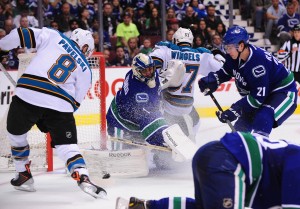Like an old, sick dog who tries valiantly to hang on as its life is coming to a close, so too did the Canucks extend their life last night, all the way into overtime before succumbing to the San Jose Sharks in a sweep of their opening round series. There will be time later to assess the next steps the Canucks need to take to try to move forward this off season, but first it is time to work through the grief by understanding what happened in the series to result in Vancouver’s demise.

Devastation at the Dot
Despite a brief uptick in success in Game 2 after Alain Vigneault complained about the Sharks “cheating,” the Canucks were crushed in the faceoff circle. This was not a new problem for Vancouver, but one that was intensified after the release of Manny Malhotra. Ryan Kesler was the only Canuck in the regular season who regularly took draws to end up well over 50 percent, with Henrik Sedin and Max Lapierre right around even and the rest of the fill-ins (Derek Roy, Jordan Schroeder, Andrew Ebbett, Alex Burrows) closer to 40 percent. In the postseason, the Canucks were beaten on 160 of 285 draws, for a win percentage of 44 percent. Kesler was again strong at 52 percent, but the rest of the team was awful, with Henrik winning 47 percent, Roy a dismal 35 percent, and Lapierre a pathetic 31 percent.
The old cliché that you can’t score if you don’t have the puck was never truer than in this series. Vancouver was chasing the Sharks far too often to generate any offensive consistency.
Too Many Dumb Penalties
This is a problem that might have been overlooked if the Shark’s powerplay wasn’t so good, but Canuck mistakes were all too often turned into San Jose goals. Vancouver put the Sharks on the power play 24 times in the series, while San Jose returned the favor only 10 times. Now yes, some of calls were a little suspect, none more so than the last one of the season on Daniel Sedin , but often it was just undisciplined play by Vancouver that got them into trouble.
San Jose subsequently converted on 7 or their 24 chances (29 percent) while Vancouver only converted 2 of 10 (20 percent). Not only is it hard to score when you don’t have the puck, it is hard to possess the puck when you are a man (or two) down.
Shots, Shots, Shots
There were way too few of these for Vancouver, resulting in far too few goals, goals, goals. The Sharks out shot the Canucks 148-124 in the series. Daniel and Henrik each scored zero goals, but at least came alive long enough to provide three assists each. But a big reason for Vancouver’s lack of success down the stretch and into the playoffs was that since April 1, Daniel scored all of two goals. Roy had one lone assist in the series.
Chris Higgins, Jannik Hansen, Zack Kassian and Jason Garrison had the same number of points as Andrew Alberts, Tom Sestito, Frank Corrado and Jordan Schroeder. The Canucks didn’t have the puck, and when they did, they didn’t shoot and they rarely scored.
Goaltending “Controversy”
It is hard to fault the goaltending too much when the rest of the team was so inept, but the Canucks heralded pair failed to steal a win when it was needed and were dominated by Anti Niemi. Roberto Luongo was great most of Game 1, but the Sharks third goal was a back breaker. The Patrick Marleau goal to send the game into overtime happened because the puck squeezed through Loungo’s legs. Game 3 was the Cory Schneider meltdown in the third period, and Game 4 ended on a sloppy rebound.
There has been much written on the Canuck’s goalie situation, but in this series, it was simply an inability of the net-minders to come up big one last time that sealed their fate.
There were obviously more problems than these (like Kevin Bieksa and Alex Edler being unable to stop turning over the puck in their own zone), but this list provides a starting point to evaluating what went wrong for the Canucks, at least in the postseason. It is time to reflect now and decide the direction this team should proceed, and whether going forward it includes GM Mike Gillis, Vigneault, Luongo and other veterans who may have worn out their welcome.